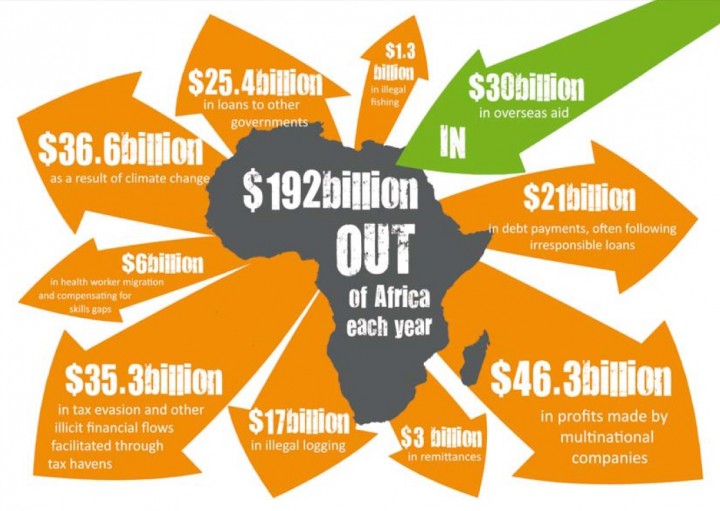
Towards the end of July each year, The UN Secretary General submits an important report to the General Assembly on the international financial system and development.
Unfortunately it is not one of those reports that is publicised or indeed commented upon much but it is hugely important nonetheless.
The report reveals much about what is actually happening as regards financial resource transfers and it annually gives the lie to the popular perception that transfers are from the rich to the poor and, of course, they are anything but.
The reports for the last 6 years highlight the massive transfer of resources from ‘developing’ and ‘emerging’ economies to the largely, western ‘developed’ countries. The figures are truly staggering especially when contrasted with the figures for aid e.g. in 2011, the estimated total of private voluntary aid to poorer countries amounted to US$30 billion; official government aid US$115 billion while transfers from such countries amounted to US$827 billion – a ratio of almost 6:1.
And we wonder why poverty persists at country and regional level! 80:20 has published a detailed educational resource on this issue – 5:50:500 which you access sample pages from and purchase) – for those interested in exploring this equation further.
The 2014 report has just be made available (in the ‘unedited’ version here).Once the edited version becomes available, I intend to summarise it and comment on it appropriately.
Earlier this month, a group of 14 NGOs from Africa and the UK published a report outlining how this process works in the case of Africa; the report entitled Honest Accounts: The True Story of Africa’s Billion Dollar Losses. The report strips away one of the greatest popular myths about our relationship with Africa and, in particular the poverty of far too many of its people.
The report describes the perverse reality in which the governments of western countries celebrate their generosity whilst directly supporting (and encouraging) international organisations and companies to drain Africa’s resources. Many western countries advertise their ‘corporate social responsibility policies’ at the same time as they make extensive use of (many unfortunately ‘legal’) tax havens to maximise their ‘take’. Wealthy philanthropists donate money whilst their companies dodge tax; and short-term fundraising tactics mean that NGOs can also be guilty of pushing the idea that poverty can be solved if we give a few pounds, ‘whilst ignoring the systematic theft going on under our noses’.
For example, the report highlights the following realities:
- over 50% of world trade passes through tax havens with havens linked to G8 countries responsible for 70% of global tax haven investment
- the UK is at the heart of this with at least 10 tax havens under its jurisdiction (11 if the City of London is included)
- 6 of the G8 countries and 18 of the 27 EU member states were found ‘not compliant’ or only ‘partially compliant’ with regulations on beneficial ownership
The report argues that while western countries send about $30bn in development aid to Africa every year, more than six times that amount leaves the continent, ‘mainly to the same countries providing that aid’.
Below is the detail of the haemorrhaging of finances from Africa as detailed by the report:
- $46.3 billion in profits made by multinational companies
- $21 billion in debt payments, often following irresponsible loans
- $35.3 billion in illicit financial flows facilitated by the global network of tax havens
- $23.4 billion in foreign currency reserves given as loans to other governments
- $17 billion in illegal logging
- $1.3 billion in illegal fishing
- $6 billion as a result of the migration of skilled workers
In addition to these resource flows Africa is forced to pay a further:
- $10.6 billion to adapt to the effects of climate change that it did not cause
- $26 billion to promote low carbon economic growth
‘If these financial outflows and costs are compared with inflows into Africa, the result is a net annual loss of $58.2 billion. This is over one and half times the amount of additional money needed to deliver affordable health care to everyone in the world. If the rest of the world continues to raid Africa at the same rate, $580 billion will be taken from the African people over the next ten years.’
The report goes on to admit that the figures included are undoubtedly an underestimate as they do not include the costs bio piracy and other intellectual property related costs, the migration of skilled professionals other than health workers, losses due to unfair trade policies or tax incentives.
Additional research by US NGO Global Financial Integrity shows Africa’s illicit outflows were nearly 50% higher than the average for the developing world from 2002-11. A 2013 report by UK NGO Action Aid argued that 50% of large corporate investment in the developing world transited through a tax haven.
The report was authored by 13 UK and Africa-based NGOs, including: Health Poverty Action, Jubilee Debt Campaign, World Development Movement, African Forum and Network on Debt and Development, Friends of the Earth Africa, Tax Justice Network, People’s Health Movement Kenya, Zimbabwe and UK, War on Want, Community Working Group on Health Zimbabwe, Medact, Healthworkers4All, Friends of the Earth South Africa, JA!Justiça Ambiental/Friends of the Earth Mozambique.
